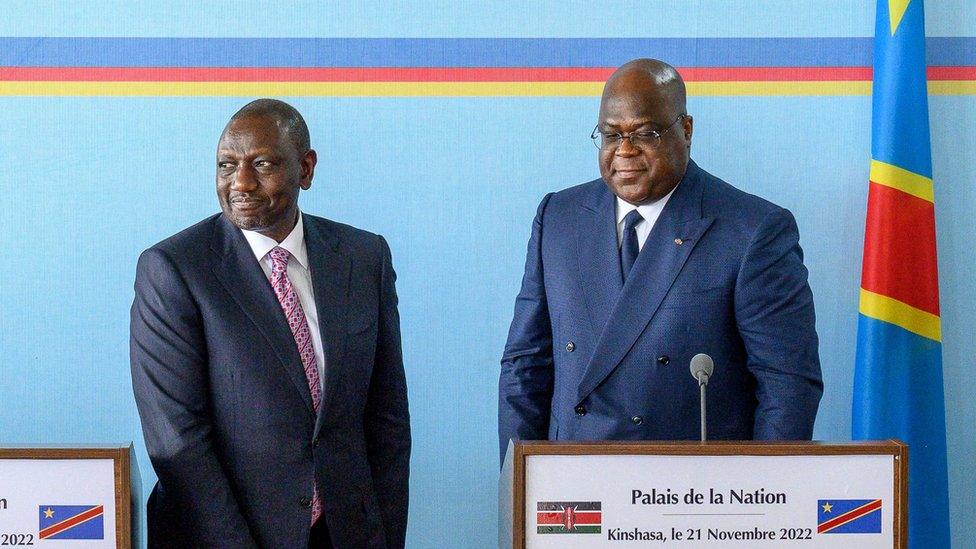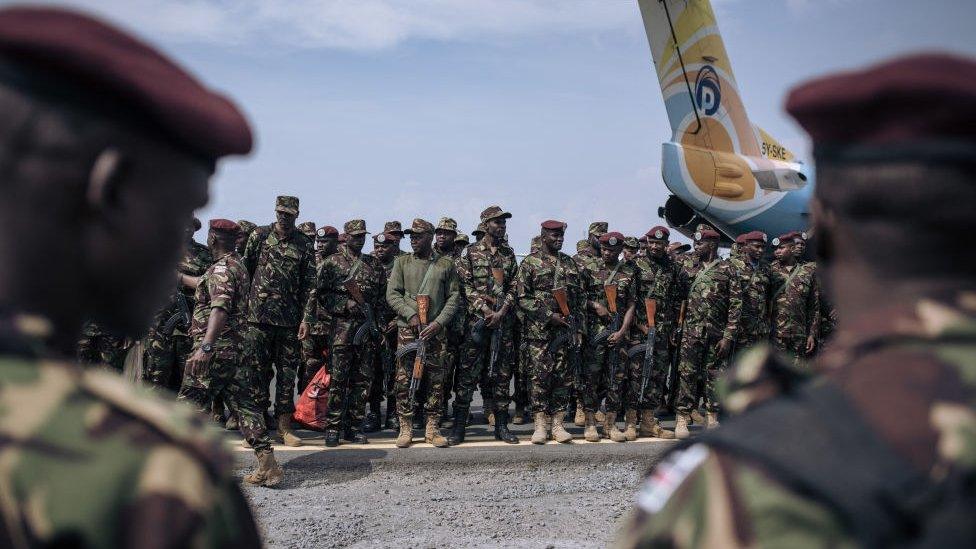Corneille Nangaa and M23: DR Congo-Kenya rebel-group row rattles region
- Published

Kenyan President William Ruto (L) was in Kinshasa to meet his Congolese counterpart Felix Tshisekedi (R) in November last year
The launch of a Congolese rebel alliance in the Kenyan capital, Nairobi, has rattled diplomatic relations between the Democratic Republic of Congo and Kenya.
It has also further soured relations between DR Congo and the regional bloc the East African Community (EAC), of which it is a recent member.
The matter has led to DR Congo recalling its envoys both from Kenya and Tanzania, which hosts the EAC headquarters.
DR Congo has also barred EAC observers from getting into the country to monitor the elections due on Wednesday.
What is the row about?
Over the weekend, Corneille Nangaa, the former head of DR Congo's electoral body, announced in a Nairobi hotel that he was creating a political-military alliance with M23 rebels and other armed groups so as to restore peace.
He was with Bertrand Bisimwa, the head of M23, one of the largest of the dozens of rebel groups that have been operating in eastern DR Congo. There are accusations that M23 is backed by Rwanda, something that Rwanda has always denied.
Mr Nangaa has in the past questioned the legitimacy of Felix Tshisekedi's presidency in DR Congo. And the fact that the announcement of his alliance with M23 was made in Kenya led to an angry reaction from Kinshasa.
It asked Kenya to stop rebel activism on its soil.
What was Kenya's response?
Kenya's President William Ruto told journalists on Sunday that he refused to heed DR Congo's request to arrest the politicians as it would have been "undemocratic".
"Kenya is a democracy. We cannot arrest anybody who has issued a statement. We do not arrest people for making statements, we arrest criminals," he said.
Kenya's foreign ministry had earlier said it "strongly disassociates" from DR Congo's internal affairs, adding that it had begun investigating the matter.
"Kenya further affirms its non-involvement in the internal affairs of the DR Congo and supports the peace, security and democratic consolidation of the country," it said.
The appearance in Kenya of the leader of M23 and Mr Nangaa, who now lives in exile, hit the DR Congo's government "in a very rough way", a foreign policy analyst told the BBC.
Macharia Munene, a professor of history and international relations at the United States International University in Kenya, said the Congolese government was clearly not happy.
What does it mean for regional relations?
With the latest row, DR Congo relations with Kenya appear to have further deteriorated, with Kenya being accused of hosting a "destructive alliance".
"I wanted to remind [Kenya] to stick to the rules and several instruments which bind us in particular the charter of the community of East African states, which ensures that we cannot attack each other, that we cannot maintain armed groups which destabilise our respective countries," DR Congo Interior Minister Peter Kazadi said in a statement.
Kenya and DR Congo have enjoyed good diplomatic relations in the past.
Kenya has hosted several talks with representatives of major rebel groups in eastern DR Congo in the past year in the elusive search for peace in the region. The talks have since stalled.
In addition, Kenyan troops were part of an East African force set up to curb militia violence in the Democratic Republic of Congo.

Kenyan soldiers left DR Congo earlier in December
The forces were ordered out of the country earlier this month following concerns by the Kinshasa government that they were ineffective.
DR Congo joined the EAC last year, but its membership has been complicated by the by the fact that Mr Tshisekedi, as well as UN experts, say fellow member Rwanda is backing the M23, which is denies.
Has Kenya's change in president changed relations?
President Ruto, who came to power last year, is seen to have a different approach from his predecessor, Uhuru Kenyatta.
Mr Kenyatta was good friends with Mr Tshisekedi and was said to have been instrumental in pushing for DR Congo to join the EAC.
He was reportedly the only African head of state at Mr Tshisekedi's inauguration in 2019 - amid reservations by the international community over the election results.
But Mr Ruto and Mr Tshisekedi are said not to be as warm.
Prof Munene says the deterioration of things between DR Congo and Kenya could also be a reflection of the not-so-good relations between Mr Ruto and Mr Kenyatta.
"We have a situation where [Mr] Ruto is not very happy with his predecessor. Maybe it's that unhappiness with his predecessor now rubbing off… This could be one of the manifestations of that," he says.
While Mr Ruto defended Kenya's refusal to arrest DR Congo's rebel leaders, Mr Kenyatta has condemned the alliance as an attempt to challenge the "the legitimate political status quo in [DR Congo]".
A statement by his office said he "repudiates these developments and in particular their military character, and the accompanying politically charged and provocative rhetoric".
Mr Kenyatta has been the facilitator of the EAC-led Nairobi Peace Process, trying to broker a peace deal between DR Congo and the rebels.
He has called for an indefinite extension of a recent US-brokered ceasefire in the region that will set the stage for the resumption of the peace talks.
What is the way forward?
DR Congo has announced there will be "consequences" for Kenya hosting the Congolese rebel leaders on its soil.
And for the first time since EAC was formed, it has been blocked from monitoring elections in a member country.
Prof Munene says Kenya should seek to resolve the issue diplomatically "carefully and without rushing".
He says while the rebel alliance may not pose an immediate threat to the Congolese authorities, that could change in due course.